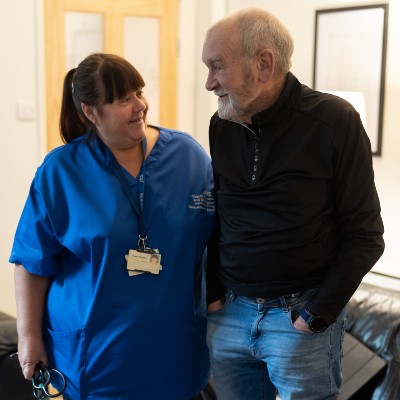County Durham Care Partnership sponsored the Carer of the Year at the County Durham Together Awards. Peter Barron assesses the partnership’s success…
The spirit of working together is at the heart of everything Durham County Council does – and the County Durham Care Partnership has been recognised as a national model for collaboration.
The Partnership (CDCP) was formed four years ago to create improved collaborations between health and social care teams, aimed at giving residents better, connected health services, closer to home.
It has been so successful that the Number 10 Downing Street Delivery Unit recently praised good practice in the Partnership, meaning our work is now nationally recognised. It followed the Partnership hosting a visit by Delivery Unit representatives to discuss joint working, especially in relation to integrated discharge arrangements, as an example of best practice. The Government’s representatives said they were particularly struck by CDCP’s culture of continuous improvement, and the teams’ commitment to improve the system even further.

As chief executive of Durham County Council, John Hewitt, is thrilled at the national recognition, and the frontline impact CDCP is having on the standards of care for people across the county. “It’s been really gratifying to see that kind of recognition because it demonstrates how working in a different way really does make a difference to the services people receive,” he says.
“As a county council, we are working really hard at getting the best value possible from ourselves and our partners – and the County Durham Care Partnership is evidence of that joined-up approach we are trying to take across all our activities.”
No wonder the Government has taken note in view of the improvements the partnership has delivered:
- 32 per cent fewer care home residents referred to hospital accident and emergency departments than the national average.
- A 60 per cent reduction in unnecessary cross-referrals between therapy teams.
- 26 per cent reduction in unnecessary hospital discharge referrals.
- 96 per cent of all medical equipment delivered on time.
- 85.4 per cent of people discharged to ‘re-enablement’ have no health contact after 91 days – better than the England average.
- More than 85 per cent of around 8,000 patients responded to in less than two hours.
- Waiting lists for home care packages have been “eliminated” because of the way the partnership jointly commissions and jointly supports care providers.
- CDCP has also been successful in attracting £6m in funding for housing and substance misuse schemes.
Those successes have been achieved by around 500 colleagues, working across 11 projects, and coming together to produce practical improvements to a range of processes. Primary, community, and social care teams work more closely than ever, sharing locations, passing on information, and solving problems more effectively.
In addition, contact centres and urgent response teams are co-located as a single point of access for urgent care and community referrals. There has also been a shift towards joint posts to establish a culture of collaboration.
“It’s right that we spend time on systems and governance within the organisation but, in the end, what really matters to people outside is the quality of the services they receive,” says John. “County Durham Care Partnership is all about putting the connections in place to make a difference to people’s lives, and the statistics clearly show the great strides that have been made through teams working together in partnership, and sharing their skills, knowledge and experience.”
Making sure County Durham has the people to deliver those vital services is another important part of the mix, and County Durham Care Academy, which is part of CDCP, provides a range of training and qualification opportunities for people wishing to pursue careers in the care sector.
Hazel Hill, from Newton Aycliffe, is a shining example of someone who has found a fulfilling new career through the support of the County Durham Care Academy. Having previously worked in retail, she was looking for a new challenge, so she switched to the care sector.
After becoming head of activities at Redworth House Care Home, in Shildon, she has gone on to become activities manager for three care homes, and never looked back. “I’m so passionate about what I do these days but, without the Care Academy’s guidance, I might never have found the perfect job,” she says.
It’s a question of “more of the same” as far as John Hewitt is concerned, as the county council’s chief executive. “We’ve built a model in the County Durham Care Partnership that’s nationally recognised for producing results, and our aim is to go on making the outcomes for the people of the county even better – in everything we do,” he says.

